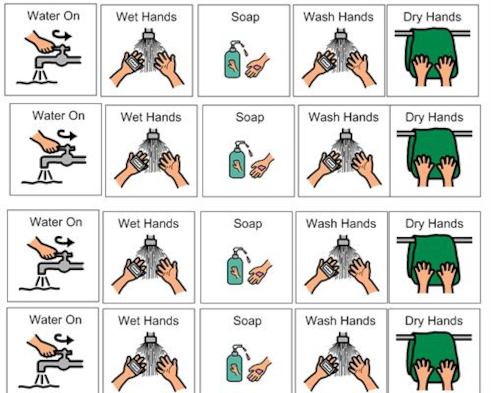Posted on September 8, 2020 by Carla Landry
 When my son was born, he was only four pounds. So, he had to spend a few days in the NICU learning how to breathe, swallow, and all of that important baby stuff. Each time I entered the nursery, I had to follow the instructions posted at the handwashing station as carefully as a surgeon preparing to enter the operating room.
When my son was born, he was only four pounds. So, he had to spend a few days in the NICU learning how to breathe, swallow, and all of that important baby stuff. Each time I entered the nursery, I had to follow the instructions posted at the handwashing station as carefully as a surgeon preparing to enter the operating room.
It never occurred to me to question the process. I simply followed it. My only goal was to pass through the doors that led past babies the size of small bread loaves, to my son’s side. As a new mother, that checklist of handwashing steps gave my postpartum brain one less thing to think about. The process was efficient, effective, and, if one can be considered proficient at handwashing, I earned a gold star. I never had to think about whether I had used enough soap, scrubbed the folds of my knuckles, or touched anything I should not.
I have thought about that handwashing process throughout the pandemic. It is a simple process, yet research suggests that we are surprisingly casual about hand hygiene. So, if during the Covid-19 crisis, global agencies like the CDC and experts like Dr. Sanjay Gupta felt it was beneficial to break down the handwashing steps for us, they had good reason. We had enough on our minds, and most of us simply followed the guidelines.
What does handwashing have to do with law firms? Not much, but it does provide a gentle segue into a process discussion. Phrases like process improvement can send a shiver of revulsion through the most valiant of attorneys. Of course, some people are fond of processes. Many lawyers and other professionals, however, believe they do not need to be told how to perform their jobs. Great…then we are on the same page because legal training is not the goal of process improvement.
To understand better how this discussion is relevant to the practice of law, we can look at ALSPs. Currently, there seems to be a lot of noise surrounding ALSPs. Why all the fuss? They have found a better, faster way to provide some types of legal services. Clients appreciate that. ALSPs are increasingly encroaching upon the space that was once the exclusive domain of lawyers, including Big Law.
Here is why: Everything is a process.
A process is simply the steps and the actions we take to get things done. Not every process is created equally. Some are more artsy and nuanced. Others require a great deal of expertise, but they are processes, nevertheless. The process is never the end goal. Rather, processes provide the means to an end. Once you break work into processes, those processes can be improved. Improve the process, and you save your mental energy for those actions that require legal and professional expertise.
The thing that makes ALSPs work is that they have mastered the art of effective and efficient processes, even for some of the more challenging legal work. Law firms are not ALSPs, but they can learn from the process model. However, it is easier said than done. The business model is different. The incentives are different. You can have world-class processes and find that not everyone is motivated to follow them.
When my son was born, I had to go through that handwashing process every time I entered the doors of the NICU. So, as I happily stood at the hospital sink singing the Alphabet Song to myself and floating on puffy clouds of baby love, I did not need to think about anything else. Just my kid.
When process improvement is introduced to a firm, it is not about the process. It is about focusing on the end goal. So, how do you get all cats herded in the same direction?
That is the subject of Part 2. Stay tuned.
About the Author: Carla Landry is a Senior Consultant with LawVision where she coaches legal teams on implementing legal project management and legal process improvement techniques into their matters. She leads the LawVision legal process improvement practice. Carla has spent over 25 years working in the legal industry, focused on helping lawyers manage their matters effectively and efficiently to enhance client relationships and improve financial performance. She was an Adjunct Faculty at the George Washington University teaching Economics and Profitability of Law Firms as part of a master’s program in law firm management and is an Advisory Board Member of the Legal Project Management Institute. In addition, Carla co-created the first legal project management certification program and launched the first online eLearning courses in legal project management (LPM LaunchPad™ Certification and LPMAware™). She also developed two online e-learning courses for the Practising Law Institute (PLI), including a Telly Award winning one on process improvement and another on law firm profitability. Click here to read more or connect with her on LinkedIn.